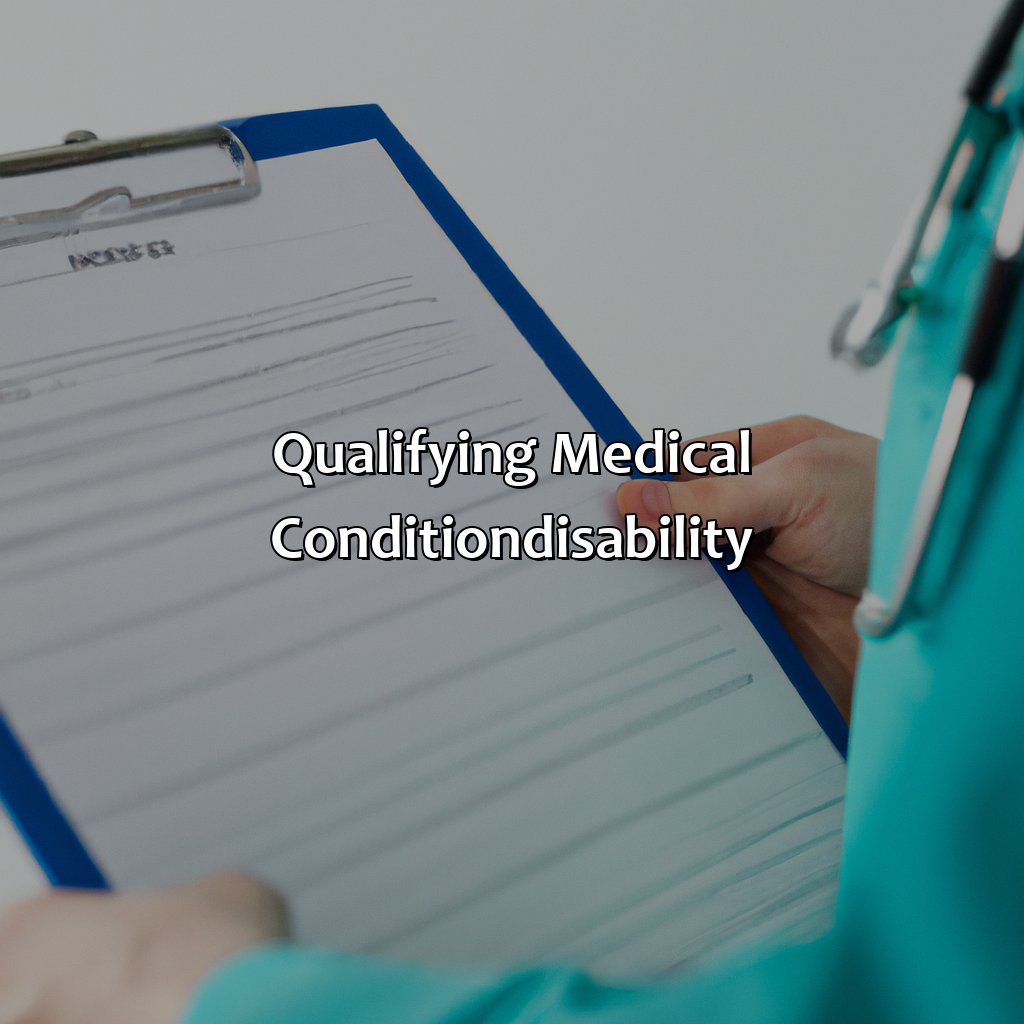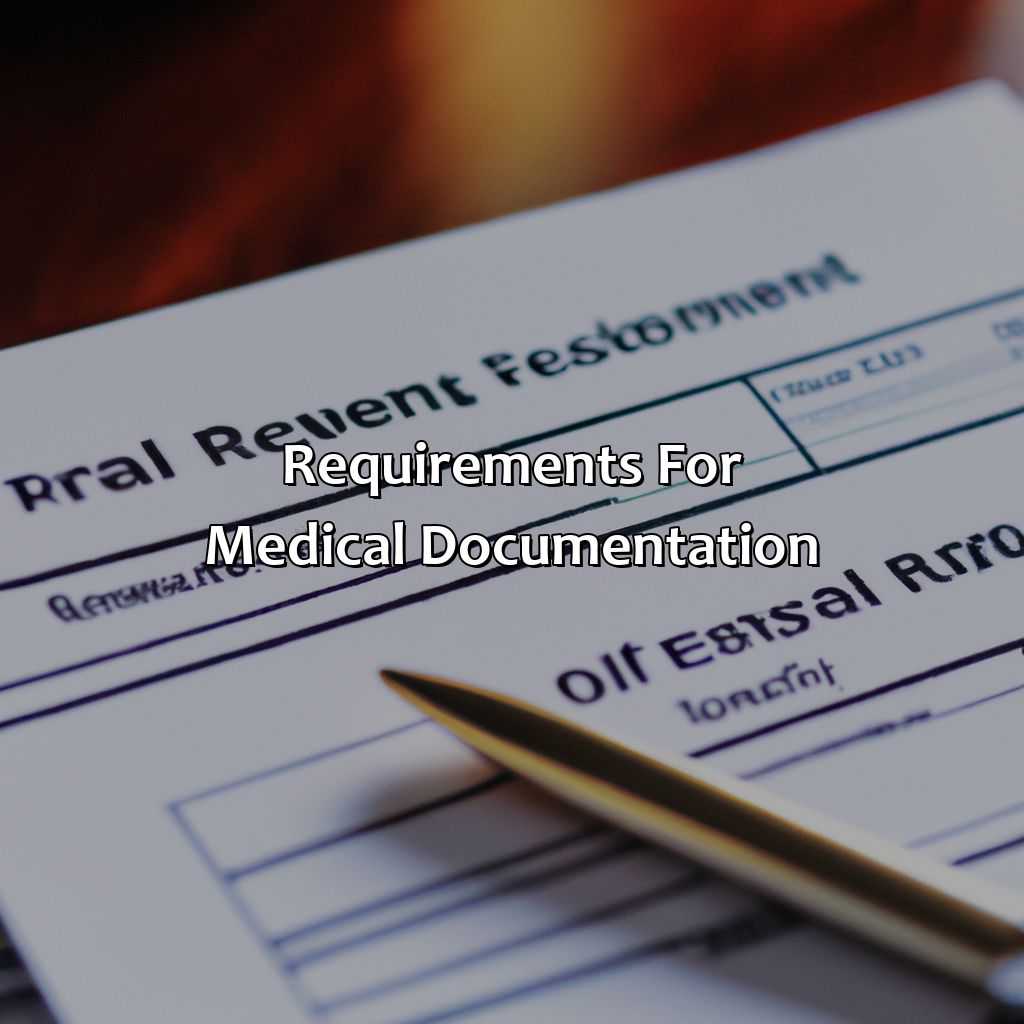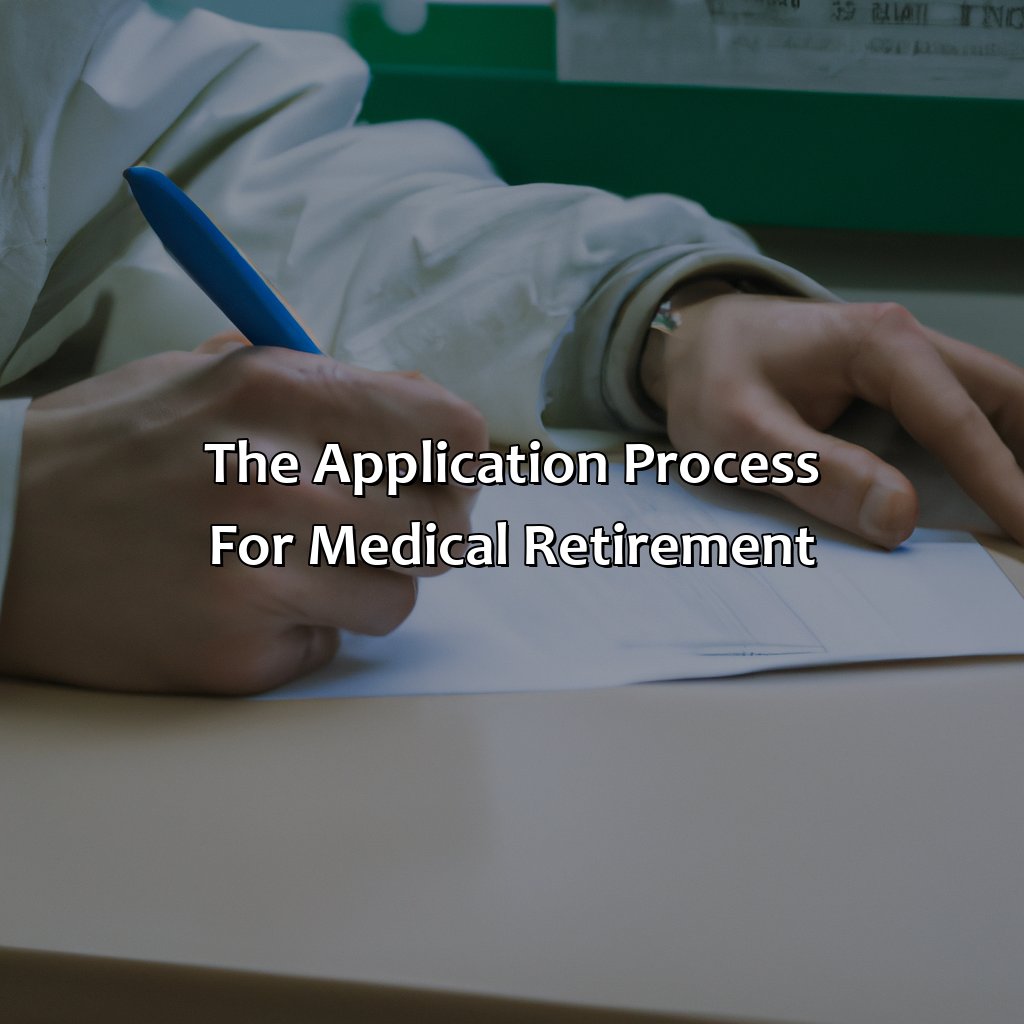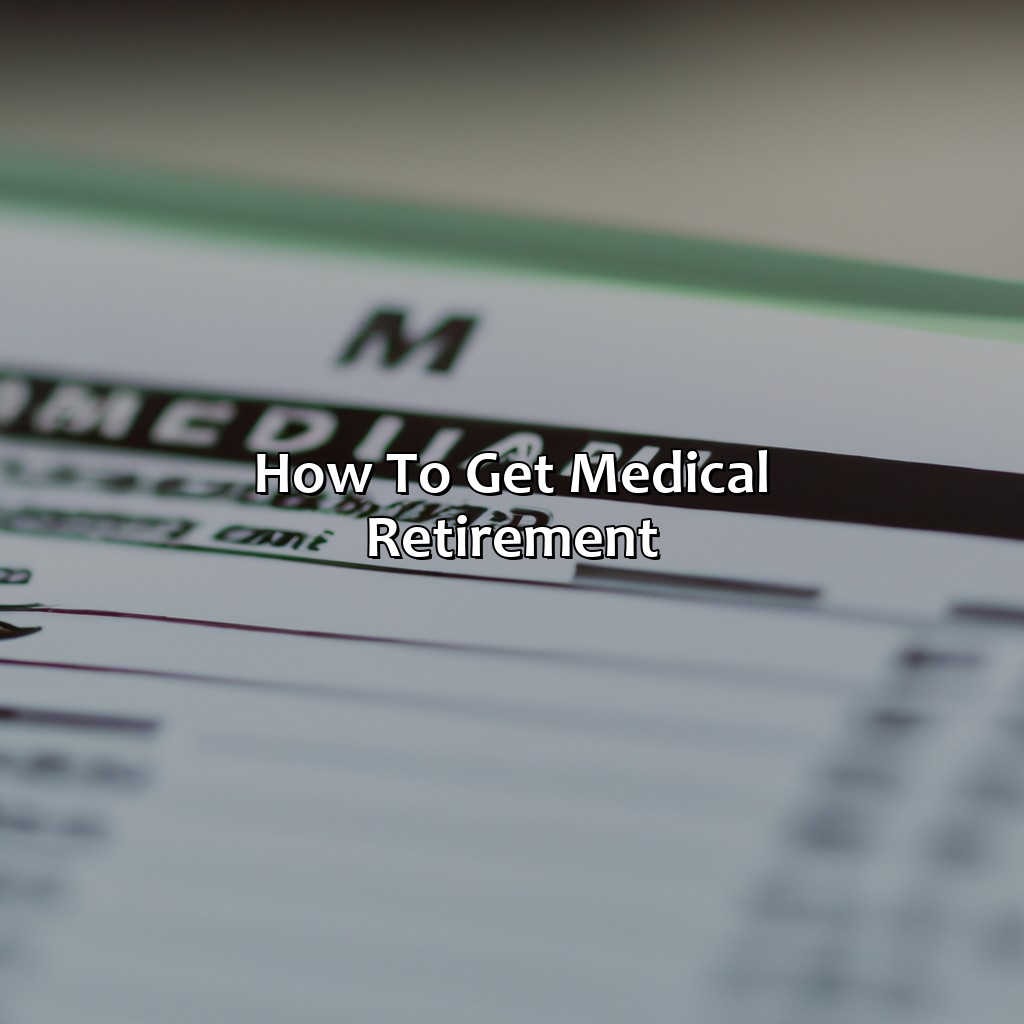How To Get Medical Retirement?
Key Takeaway:
- Eligibility for medical retirement depends on several factors, including the individual’s length of service, the severity of their medical condition, and their ability to perform their job duties.
- To qualify for medical retirement, an individual must have a medically determinable condition or disability that prevents them from performing their job duties, and the condition must be expected to last for at least one year.
- Sufficient medical documentation is essential to support a medical retirement application. The documentation should include a diagnosis, a description of the individual’s limitations, and a prognosis for recovery, if any.
- The application process for medical retirement can be complex and requires thorough documentation and attention to deadlines. It is important to seek guidance from a trusted advisor or legal professional to navigate the process.
- Financial benefits of medical retirement may include disability compensation, healthcare benefits, and eligibility for other federal benefits programs. It is important to consider the tax implications of these benefits as well.
- In the event of a denial of medical retirement, there may be legal options available to challenge the decision. It is important to consult with a legal professional who is experienced in federal employment law.
Are you struggling financially due to a medical disability? You may be eligible for medical retirement benefits that can help you maintain your standard of living. Discover how to get medical retirement and find financial relief.
Eligibility for Medical Retirement
In order to qualify for retirement on medical grounds, individuals must meet specific eligibility criteria. This may include having a medical condition that prevents the individual from performing their job duties, or experiencing significant impairment that renders them unable to work. Medical professionals must confirm the condition, and the individual must have worked for a sufficient period of time to be eligible for benefits. Meeting the requirements for medical retirement can help alleviate financial pressures and provide much needed support.
In addition to the eligibility criteria, it’s important to understand the application process for medical retirement. This typically involves submitting relevant medical documentation, along with other supporting documentation such as job performance evaluations and employment records. It’s important to carefully review the application process and requirements in order to ensure that the application is complete and accurate, to avoid any potential delays or denials.
It’s worth noting that eligibility criteria and application processes may vary depending on the specific retirement plan or system. In the United States, for example, medical retirement eligibility may differ between federal and state systems, as well as private sector retirement plans.
It’s important to consult with a qualified financial or legal professional to understand more about the specifics of medical retirement eligibility and planning. According to a recent report by Forbes, it’s estimated that over 30% of Americans do not have retirement savings, underscoring the importance of careful planning and preparation for uncertain financial futures.

Image credits: retiregenz.com by Joel Duncun
Qualifying medical condition/disability
Adequate medical conditions/disabilities are imperative to qualify for medical retirement. Meeting the criteria set forth by the laws and regulations is essential to determining eligibility. These conditions/disabilities must be considered to be both permanent and severe. Generally, an applicant must provide medical records documenting the disability, points of discussion with treating physicians, and possibly a physician assessment.
Additionally, to qualify for medical retirement, one must have been an employee of the federal government for a set amount of time, depending on the retirement system. The individual must also show that the medical condition/disability prevents them from performing the duties of their current position or any other position for which they are qualified. This must be certified by a physician.
It should also be noted that even if an individual qualifies for medical retirement, it is not always a guaranteed option. The retirement system may require the employee to use their available leave, or they may offer a different form of retirement. In such cases, it is imperative to know the laws and regulations specific to the retirement system.
Sarah worked as a federal employee for 20 years, during which time she developed a severe medical condition that hindered her ability to perform her current job duties. After several discussions with her treating physician and documentation of her medical history, Sarah qualified for medical retirement. While it was a difficult decision to leave her job, the compensation provided by medical retirement allowed her to focus on her health and well-being.

Image credits: retiregenz.com by Joel Jones
Requirements for medical documentation
To qualify for medical retirement, specific medical documentation must be presented. Such paperwork must provide sufficient information about the employee’s health condition, and most importantly, how it affects their work ability.
The medical documentation requested depends on certain factors such as the company’s policy, federal or state laws, and the kind of medical condition being reported. Generally, the employer will ask the employee to provide relevant medical documentation from a qualified healthcare provider that substantiates the medical need for retirement.
It is essential to note that medical documentation provided should be thorough and substantiated, with specific details about the employee’s medical condition and their impairments. Such information should be specific enough to help the employer and other stakeholders in making informed decisions related to medical retirement.
To ensure a successful medical retirement application, the employee must ensure that all the information provided in the medical documentation is accurate and relevant. They can also seek the guidance of an attorney to navigate the process. Alternatively, the employee can appeal decisions made, and the employer must provide evidence-based decision-making processes that support their verdict.

Image credits: retiregenz.com by David Woodhock
The application process for medical retirement
- The first step to apply for medical retirement is to consult your employer’s human resources department and obtain the necessary forms.
- Describe your medical condition and provide relevant medical documentation to support your case.
- Your employer will review your application and determine whether to approve or deny your request.
- Make sure to include all necessary paperwork and communicate any changes in your health to your employer.
- If your application is approved, you may receive benefits such as a pension or insurance coverage.
- It is important to note that eligibility requirements and benefits may vary by employer and location. Therefore, it is important to gather all the necessary information and seek advice from a professional.
- To avoid missing out on the benefits of medical retirement, create a timeline and follow up with your employer regularly.
- Stay informed about your rights and options, and take action promptly. Your health and financial security depend on it.

Image credits: retiregenz.com by James Arnold
Financial benefits and consideration for taxes
Financial Gains and Tax Implications of Medical Retirement
Retiring due to a medical condition can impact your finances significantly. It’s crucial to be aware of the financial benefits and tax considerations that come with medical retirement. Here are some key points to keep in mind:
- Disability Retirement Income: If you’re unable to work due to a severe medical condition, you may qualify for disability retirement pay from your employer, which is generally tax-free. However, you may be taxed on the disability income if you receive it from an insurance policy or other outside sources.
- Social Security Disability Benefits: If you have a disability and have paid into Social Security, you may be eligible for Social Security Disability Insurance (SSDI). The amount you receive is based on your work history and the extent of your disability.
- Healthcare Coverage: Medical retirement often comes with continued healthcare coverage, which can help cover expensive medical treatments or surgeries. The coverage may either be provided by the employer or be under the Consolidated Omnibus Budget Reconciliation Act (COBRA).
- Early Pension Withdrawals: Some pension plans allow for early withdrawals if you take medical retirement due to a disabling condition. However, taking an early withdrawal may result in penalties and taxes, so consult a financial advisor to determine your eligibility and risks.
- Tax Implications: While disability income is typically tax-free, there may be tax implications for other financial benefits like pensions and SSDI. It’s essential to understand the tax rules that apply to your situation.
It’s worth noting that each situation is different, and there may be other unique details to consider regarding your medical retirement benefits and tax implications. Ensure that you consult with a financial advisor to meet your specific medical and financial needs.
Don’t let the fear of missing out on the financial benefits of medical retirement hold you back. Seek guidance from a professional and take advantage of the benefits that may be available to you.

Image credits: retiregenz.com by James Woodhock
Legal options in the event of retirement denial
In the event of being denied retirement on medical grounds, it is important to understand the legal options available for recourse. These options may involve filing an appeal and requesting a re-evaluation of the medical evidence presented. Seeking legal assistance from a specialized attorney can also provide guidance and representation throughout the process.
It is crucial to document all communication with the employer and medical professionals to ensure accurate and complete information is presented to bolster the case. Further, understanding the terms and conditions of retirement benefits and eligibility criteria can help in making informed decisions and presenting a solid case.
In addition to these legal options, it may also be helpful to explore alternative routes, such as seeking an independent medical opinion or requesting accommodations in the workplace. Each suggestion can work in different scenarios, and seeking counsel or advice from professionals in these areas can lead to more desirable outcomes.
In summary, understanding the legal options available and being proactive in documenting and presenting evidence can significantly improve the chances of attaining medical retirement. Seeking alternative routes and professional guidance can also increase the options available and lead to a favorable outcome.

Image credits: retiregenz.com by Adam Washington
Five Facts About How To Get Medical Retirement:
- ✅ Medical retirement is a type of retirement program offered to employees who are unable to work due to health issues. (Source: Investopedia)
- ✅ To qualify for medical retirement, an employee must meet certain eligibility criteria set by their employer or government agency. (Source: The Balance Careers)
- ✅ The process of applying for medical retirement typically involves submitting medical documentation and undergoing evaluations by medical professionals. (Source: Disability Secrets)
- ✅ Medical retirement benefits may include disability payments, healthcare coverage, and other retirement benefits. (Source: Retirement Benefits Authority)
- ✅ It is important to consult with a financial advisor or retirement specialist before making decisions about medical retirement to ensure financial security in retirement. (Source: NerdWallet)
FAQs about How To Get Medical Retirement?
How do I qualify for medical retirement?
To qualify for medical retirement, you must have a medical condition that prevents you from performing your job duties. You must also have worked for your employer for a certain period of time, as outlined in your company’s retirement policy.
What documentation do I need to apply for medical retirement?
You will need medical documentation that supports your condition and shows that it prevents you from doing your job. This may include medical records, doctor’s notes, and disability evaluations.
How do I start the process of applying for medical retirement?
You should speak with your employer or HR representative to find out what steps you need to take to apply for medical retirement. They will likely provide you with forms to fill out and guidelines to follow.
Can I receive other benefits in addition to medical retirement?
You may be eligible for other benefits, such as Social Security Disability Insurance or Workers’ Compensation, in addition to medical retirement. It is important to check with your employer and government agencies to see what other benefits you may be eligible for.
What happens if my application for medical retirement is denied?
If your application for medical retirement is denied, you may have the option to appeal the decision. You should work with your employer and any legal or medical advisors to determine the best course of action.
How long does the process of getting medical retirement take?
The length of time it takes to get medical retirement will vary, depending on your employer’s policies, the extent of your medical condition, and other factors. It is important to be patient and persistent in working through the process.







